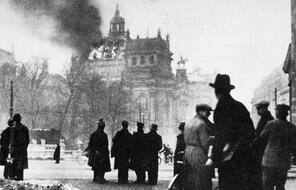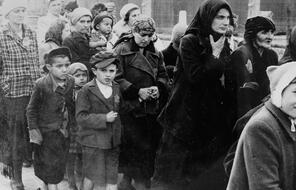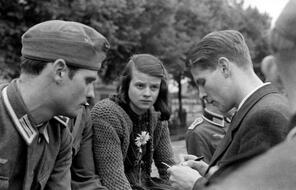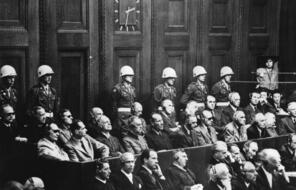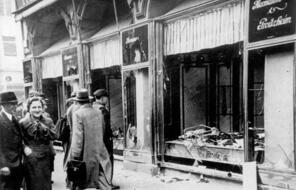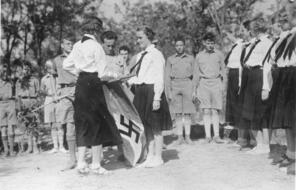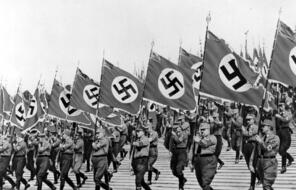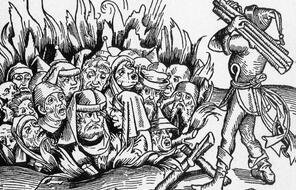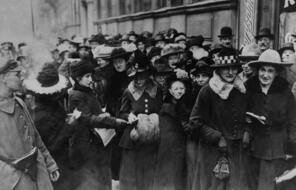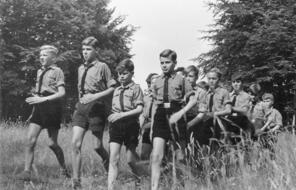Between Peace and War
At a Glance
Language
English — USSubject
- History
- Human & Civil Rights
- The Holocaust
War had erupted, with Austria-Hungary and Germany on one side and Russia and France on the other. German war plans, drawn up long before the conflict, called for quickly defeating France with a rapid attack so that it could then turn its full attention to fighting Russia. The quickest way to attack France was to march through Belgium, even though it was a neutral country that Britain had vowed to defend. The invasion of Belgium by German troops, which caused substantial destruction and many civilian casualties, prompted Britain to join the war on the side of Russia and France. Full-scale European war was now under way. Countries allied with Germany and Austria were known as the Central powers. Those who supported Serbia, Russia, France, and Britain were called the Allies. On August 23, 1915, Japan joined the Allies. That same year, the Ottoman Empire (Turkey) joined the Central powers, while Italy (which had previously supported Germany) now backed the Allies.
As world leaders were choosing sides, a few individuals and groups in almost every nation had been trying desperately to stop the momentum toward war. On July 28, 1914, the German Social Democratic Party, then the largest political party in the world, held a huge public meeting that ended with cries of “Down with war! Long live world peace and the brotherhood of the working class!” Over the next few days, there were more rallies for peace. Then the news came that Germany had declared war. Almost instantly, the demonstrations came to a halt, and party leaders issued the following statement:
We are face to face with destiny. The consequences of imperialistic policies, which ushered in an era of competitive war preparation and which roused the antagonistic elements of various peoples, are crashing over Europe like a tidal wave. The responsibility for this disaster lies with the supporters of these policies; we are not responsible. Social Democracy has done everything in its power to fight this disastrous development and has worked to the very last minute to uphold peace by organizing powerful demonstrations in all countries, especially in close cooperation with our French comrades. Our efforts have been in vain.
Now we face the inexorable fact of war. The horror of hostile invasion threatens us. Today it is not for us to decide for or against war; rather we must decide which means are necessary for the defense of our country. Now we must think of the millions of our fellow countrymen who are drawn into this disaster through no fault of their own. It is they who will suffer the most from the horrors of war. Our most heart-felt wishes go out to all these, irrespective of party, who have been called to arms. We also remember the mothers who must give up their sons, the women and children robbed of their providers. For them, fear for their loved ones is combined with the threat of hunger. And this army of women and children will soon be joined by tens of thousands of wounded and crippled soldiers. To help all of them, to improve their fate, to erase their inestimable suffering—we consider this our urgent duty. 1
Now thousands of Germans gathered in the streets not to protest the war but to show their support for it. Ernst Toller, a young German socialist, was studying abroad when war was declared. He immediately headed back to Germany on the last train to leave France before the borders closed. He later recalled that when the train made its first stop in Germany, he and other passengers received photos of the kaiser inscribed with the words “I recognize no parties; only Germany.” Toller marveled, “The Kaiser recognized no parties; there it was in black and white; all factions were to be united; everybody spoke one language; everybody defended one mother: Germany.” 2
As a Jew, Toller had experienced discrimination; as a socialist, he was against war; and yet he enlisted in the army as soon as he crossed the border into Germany. He wasn’t alone; more than 100,000 Jews fought in the German army during World War I. In fact, Jews were represented in every army involved in the conflict. The same was true of other religious minorities.
As subjects of the British Empire, thousands of men from Ireland, Canada, India, and Australia joined the Allied armies. Even though Britain was in the midst of a crisis over Irish demands for “home rule”—the right to self-government—thousands of Irishmen enlisted in the British army. When asked in 1916 why he had volunteered, Captain Bellenden S. Hutcheson, a young Canadian physician, replied:
In the first place, I was in great sympathy with the Allied cause, secondly I am chiefly of English descent; my great grandfather served under Lord Nelson and lost an eye in the battle of Trafalgar and my paternal grandfather came to the U.S. from England in the 1840s and was Captain and adjutant on a New York regiment during the Civil War. The third factor was the desire for surgical experience and adventure which I felt war service would afford. 3
Only a few men refused to fight. They declared themselves conscientious objectors—people who refuse to serve in or aid the military for religious or moral reasons. A British man who called himself “Artifex” expressed his views of their stand in a letter that appeared in the Manchester Guardian: “I think that to be a real conscientious objector a man must be, consciously or unconsciously, an extreme individualist with little sense of the solidarity of mankind and of our membership one of another.” 4 Philosopher Bertrand Russell sent a letter to the Guardian in response:
There are no doubt many kinds of reasons which lead men to become conscientious objectors, but I am convinced that the chief reason, and the most valid, is precisely that sense of “the solidarity of mankind,” of “our membership with one another,” which “Artifex” denies to us. It seems to me that when he wrote of “mankind” he was thinking only of the Allies. But the Germans too, are included among “mankind.” The conscientious objector does not believe that violence can cure violence or that militarism can exorcise the spirit of militarism. He persists in feeling “solidarity” with those who are called “enemies,” and he believes that if that feeling were more widespread among us it would do more than armies and navies can ever do to prevent the growth of aggressive Imperialism, not only among ourselves but also among potential enemies. 5
In other letters, Russell continued to defend his position even as he described himself as “tortured by patriotism.” “Love of England,” he wrote in one letter, “is very nearly the strongest emotion I possess, and in appearing to set it aside at such a moment, I was making a very difficult renunciation.” 6 In another letter, he wrote, “The greatest difficulty was the purely psychological one of resisting mass suggestion, of which the force becomes terrific when the whole nation is in a state of collective excitement.” 7
Almost everywhere, conscientious objectors were imprisoned for refusing to fight. Russell was no exception.
Connection Questions
- Why did the German Social Democratic Party, which had worked for peace, decide to support the war?
- Why do you think anti-war demonstrations in Germany came to a halt as soon as war was actually declared?
- What does it mean to be a “conscientious objector”? Can one be both a patriot and a conscientious objector?
- How would you define Captain Hutcheson’s universe of obligation? How does it compare with that expressed by Bertrand Russell?
- 1Hugo Haase, “The Socialists Support the War (August 4, 1914),” trans. Jeffrey Verhey, German History in Documents and Images website, German Historical Institute, accessed March 2, 2016.
- 2Ernst Toller, I Was a German: The Autobiography of a Revolutionary (St. Paul, MN: Paragon House, 1991), 62.
- 3“Wartime Letter from Captain Bellenden S. Hutcheson,” Veterans Affairs Canada, last modified November 16, 2014.
- 4Quoted in Bertrand Russell, “Conscientious Objectors,” Manchester Guardian, March 19, 1917.
- 5Quoted in Bertrand Russell, “Conscientious Objectors,” Manchester Guardian, March 19, 1917.
- 6Bertrand Russell, Man's Peril, 1954–55, ed. Andrew G. Bone (London: Routledge, 2003), 128.
- 7Bertrand Russell, “Some Psychological Difficulties of Pacifism in Wartime,” in We Did Not Fight: 1914–1918 Experience of War Resisters, ed. Julian Bell (London: Cobden Sanderson, 1935), 329.
How to Cite This Reading
Facing History & Ourselves, "Between Peace and War," last updated August 2, 2016.


